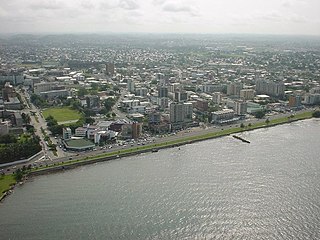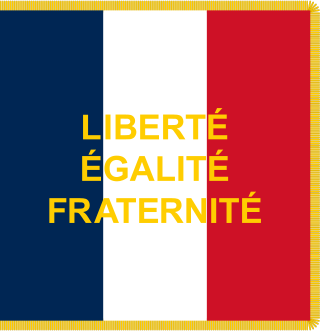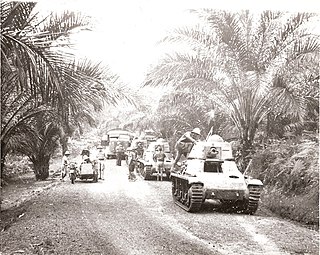Related Research Articles

Gabon, officially the Gabonese Republic, is a country on the Atlantic coast of West Central Africa. Located on the equator, it is bordered by Equatorial Guinea to the northwest, Cameroon to the north, the Republic of the Congo on the east and south, and the Gulf of Guinea to the west. It has an area of nearly 270,000 square kilometres (100,000 sq mi) and its population is estimated at 2.3 million people. There are coastal plains, mountains, and a savanna in the east. Libreville is the country's capital and the largest city.

Brazzaville is the capital and largest city of the Republic of the Congo. From an administrative perspective, it is a department and a commune. Constituting the financial and administrative centre of the country, it is located on the north side of the Congo River, opposite Kinshasa, the capital city of the Democratic Republic of the Congo.

French Equatorial Africa was a federation of French colonial territories in Equatorial Africa which consisted of Gabon, French Congo, Ubangi-Shari, and Chad. It existed from 1910 to 1958 and its administration was based in Brazzaville.

Libreville is the capital and largest city of Gabon. Occupying 65 square kilometres (25 sq mi) in the northwestern province of Estuaire, Libreville is a port on the Komo River, near the Gulf of Guinea. As of the 2013 census, its population was 703,904.


The French Community was the constitutional organization set up in 1958 between France and its remaining African colonies, then in the process of decolonization. It replaced the French Union, which had reorganized the colonial empire in 1946. While the Community remained formally in existence until 1995, when the French Parliament officially abolished it, it had effectively ceased to exist and function by the end of 1960, by which time all the African members had declared their independence and left it.

Jacques Foccart was a French businessman and politician, best known as a chief adviser to French presidents on African affairs. He was also a co-founder of the Gaullist Service d'Action Civique (SAC) in 1959 with Charles Pasqua, which specialized in covert operations in Africa.
Legislative elections were held in France on 10 November 1946 to elect the first National Assembly of the Fourth Republic. The electoral system used was proportional representation.

The Battle of Gabon, also called the Gabon Campaign, occurred in November 1940 during World War II. The battle resulted in forces under the orders of General de Gaulle taking the colony of Gabon and its capital, Libreville, from Vichy France, and the rallying of French Equatorial Africa to Free France.
The Congolese Progressive Party was a political party in Congo-Brazzaville. It was the first Congolese political party, and the Congolese section of the African Democratic Rally (RDA). Until 1950 PPC was closely connected to the French Communist Party. The party was largely based amongst the Vili people. Aubert-Lucien Lounda was the General Secretary of the party.

The first elections to the Representative Council of Moyen-Congo were held between December 1946 and January 1947. A government decree, issued on 26 October 1946, had called for the holding of elections for Representative Councils in each of the territories of French Equatorial Africa.
The Economic Liberation Movement was a political party in Moyen-Congo, formed by European settlers who had arrived in the colony after the Second World War. The party contested the 1952 Moyen-Congo Representative Council election from the Brazzaville constituency. It thus pitted itself against the Gaullist RPF in contesting for the votes of the Brazzaville Europeans.
Elections to the French National Assembly were held in Gabon and Moyen Congo as part of the wider French elections election on 10 November 1946.
Comité de liaison de patronat de l'A.E.F. was an employers' organization in French Equatorial Africa (AEF). It had territorial branches in each of the four territories of AEF. COLPAEF was founded a few days after the introduction of the French Overseas Labour Code in 1953. The organization was affiliated to the Conseil national du patronat français (CNPF), the French National Employers Council. A Permanent Secretariat coordinated the activities of the four territorial branches of COLPAEF.

France–Africa relations cover a period of several centuries, starting around in the Middle Ages, and have been very influential to both regions.
The Confédération africaine des travailleurs croyants de l'A.E.F was a trade union confederation in French Equatorial Africa. CATC was founded in Pointe-Noire January 2–6, 1957 by the branches of the French trade union centre C.F.T.C in Gabon, Moyen-Congo, Chad and Ubangi-Shari. Gilbert Pongault was the chairman of C.A.T.C-A.E.F. The C.A.T.C-A.E.F retained a separate organization from the West African C.A.T.C, which had been formed a few months earlier. The two organizations did however maintain contacts between each other, albeit the attitude of C.A.T.C.-A.E.F towards its counterpart was characterized by jealousy towards the stronger unions in West Africa.

The Cameroon–Central African Republic border is 901 km in length and runs from the tripoint with Chad in the north to the tripoint with the Republic of the Congo in the south.

The Central African Republic–Republic of the Congo border is 487 km in length and runs from the tripoint with Cameroon in the west to the tripoint with the Democratic Republic of the Congo in the east.

Free French Africa was the political entity which collectively represented the colonial territories of French Equatorial Africa and Cameroon under the control of Free France in World War II.
References
- 1 2 3 4 Barrett, David B. Schism and Renewal in Africa; An Analysis of Six Thousand Contemporary Religious Movements . Nairobi: Oxford University Press, 1968. pp. 55, 289
- ↑ Bernault, Florence. Démocraties ambiguës en Afrique central: Congo-Brazzaville, Gabon: 1940-1965 . Paris: Éd. Karthala, 1996. p. 190
- ↑ Thompson, Virginia, and Richard Adloff. The emerging states of French Equatorial Africa . 1960. pp. 44, 313
- 1 2 Le Vine, Victor Theodore. Politics in Francophone Africa . Boulder, Colo. [u.a.]: Lynne Rienner, 2004. p. 189